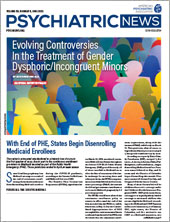Over recent years,
several states have moved forward with prior authorization reform, with APA’s advocacy behind them. Now some reforms are occurring at the federal level, as well.
In April, the Centers for Medicare & Medicaid Services (CMS) finalized a
new rule related to prior authorization in Medicare Advantage plans and the Medicare prescription drug benefit. The rule attempts to address concerns that CMS has received related to how these plans use prior authorization and its impact on patients’ access to care, the agency said in a
fact sheet.
Further, a recent investigation highlighted flaws in how prior authorization is used in Medicare Advantage plans. The U.S. Department of Health and Human Services Office of Inspector General
reported that, after reviewing a random sample of prior authorization denials, 13% of those denials met Medicare coverage rules. “[I]n other words, these services likely would have been approved for these beneficiaries under original Medicare,” the report stated.
Overall, the new rule attempts to clarify the criteria that Medicare Advantage plans use in establishing their prior authorization policies. Some of the provisions include the following:
•
The rule states that Medicare Advantage plans must comply with national coverage determinations (which CMS develops through an evidence-based process, with opportunities for public participation), local coverage determinations, and general coverage and benefit conditions that are included in traditional Medicare regulations.
•
The rule streamlines prior authorization requirements, adding continuity of care requirements that aim to reduce disruptions in patient care. Plans are required to provide a minimum 90-day transition period when an enrollee currently undergoing treatment switches to a new Medicare Advantage plan.
•
Additionally, the rule requires all Medicare Advantage plans to establish a Utilization Management Committee that reviews policies annually and ensures consistency with traditional Medicare’s national and local coverage decisions and guidelines. A majority of the members of these committees must be practicing physicians, including at least one physician who is independent and free of any conflicts of interest.
•
The rule also aims to address health equity, such as by expanding the example list of populations to which Medicare Advantage plans must provide services in a culturally competent manner, such as people with limited English proficiency; people with disabilities; and people who identify as transgender, nonbinary, or gender diverse.
APA wrote a
letter to CMS after it proposed the rule last December, expressing its support for the agency’s efforts to reform prior authorization and offering a slew of suggestions to streamline the process, improve access to care, and advance health equity. APA also joined with the AMA and dozens of other medical organizations in sending CMS another
letter with suggestions for the rule. In this letter, the AMA, APA, and the other organizations highlighted the need for reform by pointing to the
AMA physician survey conducted in December 2022 among a sample of 1,001 practicing physicians. Nearly 95% of the respondents reported care delays or disruptions associated with prior authorization. Further, 33% of the respondents reported that prior authorization led to a serious adverse event for a patient in their care, such as hospitalizations, permanent impairment, or even death.
The survey also found that nearly 35% of respondents have staff who work exclusively on prior authorization, and 88% describe the burden associated with prior authorization as high or extremely high.
The new rule is one of two that CMS proposed last December to reduce unnecessary burdens related to prior authorization, according to the agency. The
second rule, which has yet to be finalized, would enhance the exchange of health data and invest in interoperability. It would require payers such as Medicare Advantage plans, state Medicaid agencies, and others to implement an electronic prior authorization process, shorten the time frame by which they must respond to prior authorization requests, and establish policies to make the entire process more efficient and transparent.
In a letter to the agency, APA thanked CMS for proposing the interoperability rule and suggested revisions to the final rule. “Increased sophistication and standardization of technology only works for settings that are operating on an electronic data system, and on one where they can manage and afford upgrades,” APA’s letter stated. “To effectively focus efforts on standardization and interoperability, the root causes of technological inequity in clinical mental health settings need to be addressed through financial incentives, technical assistance, and learning networks.”
In addition to CMS’s final and proposed rules, Congress has taken some action on prior authorization as well. In September, the U.S. House of Representatives passed the APA-supported
Improving Seniors’ Timely Access to Care Act of 2021, which would standardize and streamline the prior authorization process in Medicare Advantage plans. The bill did not pass the Senate, however. ■

